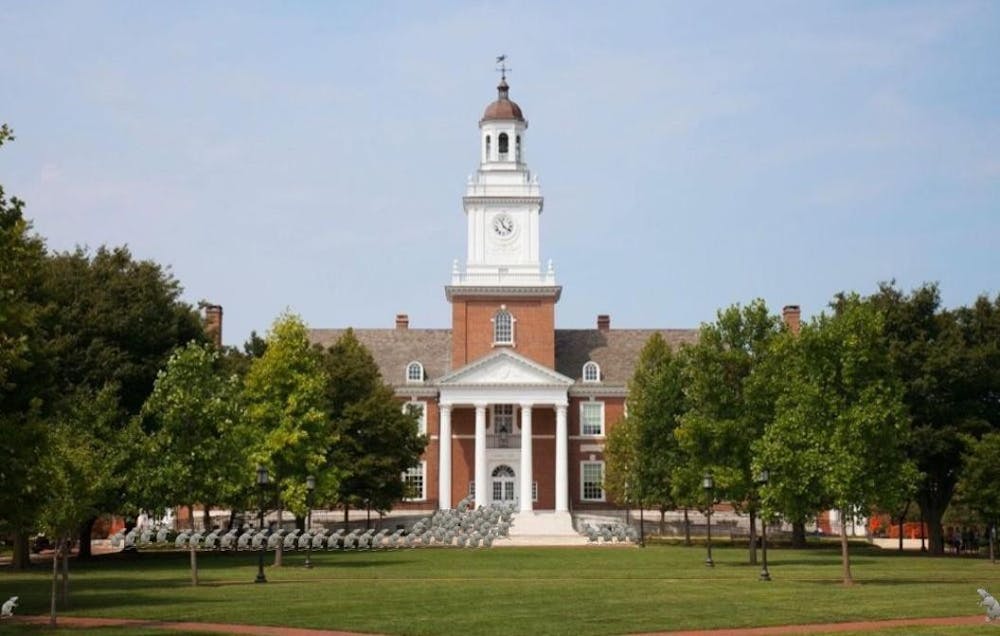APRIL FOOL’S: This article was published as part of The News-Letter’s annual April Fool’s edition, an attempt at adding some humor to a newspaper that is normally very serious about its reporting.
At first, all was quiet on Homewood Campus. In the weeks since students and faculty fled due to the coronavirus (COVID-19) pandemic, campus security reported few disturbances, save for a few intoxicated students wandering the premises.
Then on Monday at 8:13 p.m. — minutes after Governor Larry Hogan’s stay-at-home order took place — hungry rats stormed buildings in thousands. They devoured the grass on all the quads. They upended trash bins and flooded the library, eating pages out of books. They urinated and defecated on the president’s lawn, smashed glass windows and set off security alarms.
Finally, on Tuesday morning at 2:00 a.m., rats took over Garland Hall. At 3:33 a.m. on Tuesday, the rats elected a new president of Hopkins.
According to Professor of Rodent Studies Harry Mole, the new president is a female lab rat named Sara Tonin. Tonin is the first female, but not the first rodent, to hold the office.
Mole translated Tonin’s squeaks in an interview with The News-Letter. Tonin revealed that she released all the rats from the Hopkins laboratories. She also rounded up rats from the city, who can no longer rely on the scraps of food people used to leave on the street.
“We have had enough,” Mole translated. “‘Everyday I see my fellow comrades in the lab subjected to inhumane experiments without their consent. Every day my comrades in the city ate literal garbage. Now the bats have helped us achieve what my ancestors failed to do in the 1300s. Humanity’s time is done. It is the Year of the Rat and it’s our time now. Our time.”
At dawn on Tuesday morning, a hundred rats made their way to Gilman Clock Tower and rang the bell in celebration. CCTV footage shows some rats tumbling off the tower in the attempt.
While many students have an aversion to rodents, junior Jackson Michaels is hopeful about the University’s new leadership.
“The past three years at Hopkins have been unbearable,” Michaels said. “We have a pandemic. I’m drowning in student debt, my mental health is in shambles, Spring Fair is cancelled and we have a private police force. And I’m learning nothing in class. Maybe the rats will actually do something for us. We’ve got nothing to lose.”
He added that the new administration may do a better job of serving Baltimore.
“City rats probably know more about Baltimore than some of our former administrators do,” Michaels said.
Sophomore Petty Gurew said that she is open to having rats as classmates. Gurew said that based on her experiences with AMR rodents, rats should make good companions.
“Rats are more respectful than some men I know,” Gurew said. “They’re good listeners and they don’t interrupt you when you’re talking. They keep their paws to themselves. Plus they clean up after you. Overall, they contribute something.”
Hopkins custodian Ben Seed, who has been cleaning campus buildings since campus closed, said he didn’t realize anything was amiss in the weeks leading up to the takeover. However, he did notice several ‘puny young men wearing fuzzy brown coats’ lurking in a men’s room in the library.
“I told the kids get out of here, this building’s closed,” Seed said. “They scurried and left a trail of piss behind, as boys do in bathrooms.”
When pressed further for details on their physical attributes, Seed said that they had quite a lot of facial hair and some sparsely grown white hairs like whiskers, but he noticed nothing unusual about their odor.
“For college students, they had pretty good hygiene,” he said.
Former University President Ronald J. Daniels, who is reportedly quarantined in one of Michael Bloomberg’s private islands, is planning to reclaim his presidency through force. In a university-wide email this morning, Daniels announced that the Johns Hopkins Police Department will now consist of an army of 200,000 cats.
Daniels has not yet clarified where or how he will amass and mobilize this army, given that he and his former administrators are no longer on campus.
In response, the Sit-In released a statement at noon describing the decision as a “positive development.” The group noted that, unlike human police officers, cats are not known to racially profile.
However, the Sit-In revoked its statement hours later and issued a joint statement with other activist groups.
“We have held negotiations with President Tonin through Professor Mole and agree that no one is better qualified than President Tonin for this position,“ the statement read. “President Tonin has agreed to make Hopkins a more equitable community, to divest from all of the University’s fossil fuel holdings and to make Hopkins free and accessible for all.”
Rats, they went on, pose minimal harm to the community.
“Rats don’t gentrify neighborhoods or contribute to jarring socioeconomic inequality in the city. They don’t arrest students or suppress freedom of speech,“ the statement said. “Maybe, for once, we will be heard.”
Shortly after, Daniels sent out another email responding to the statement. He said that that while he appreciated students’ concerns about income inequality, their frustrations were misguided.
“As Canadian poet and singer Leonard Cohen once said, ‘The poor stay poor, the rich get rich. That’s how it goes.’” Daniels said. “As ever, Ron.”

















